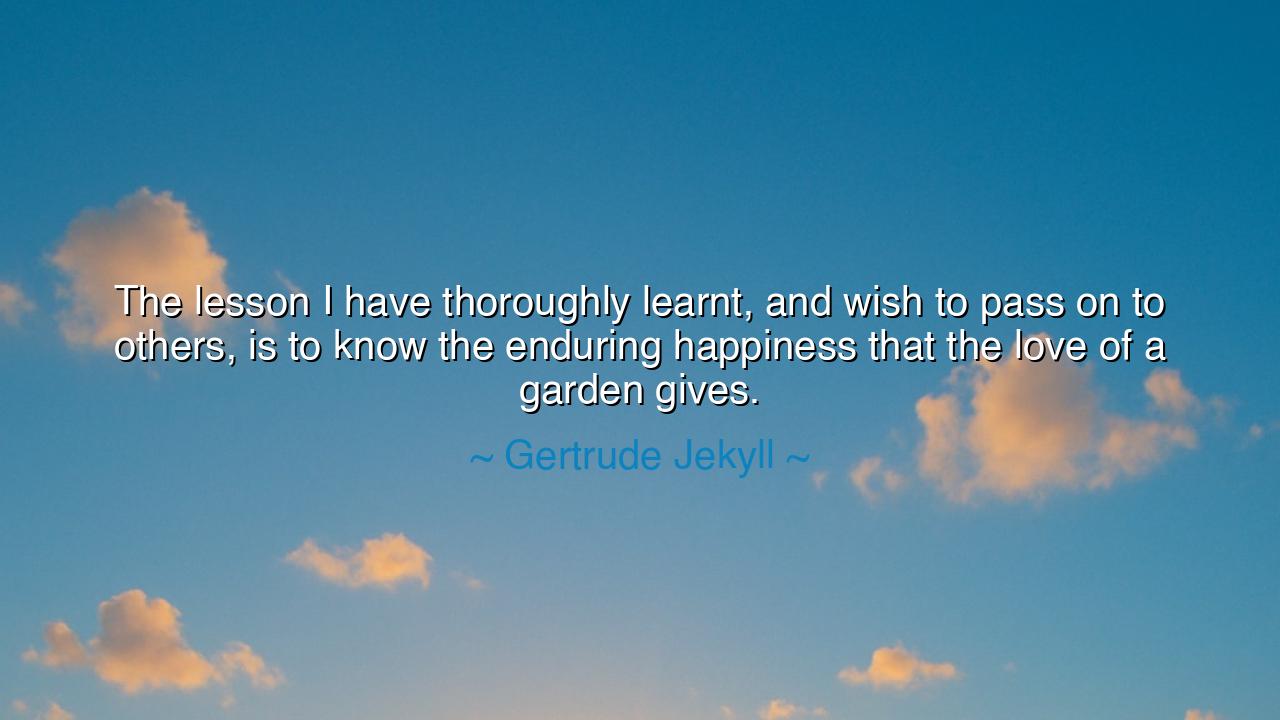
The lesson I have thoroughly learnt, and wish to pass on to
The lesson I have thoroughly learnt, and wish to pass on to others, is to know the enduring happiness that the love of a garden gives.






Hear now, the timeless words of Gertrude Jekyll, the great artist of earth and bloom: “The lesson I have thoroughly learnt, and wish to pass on to others, is to know the enduring happiness that the love of a garden gives.” These are not idle musings, but the distilled wisdom of a life lived in communion with the living world. For Jekyll, as for the sages of old, the garden was not mere decoration, but revelation — a mirror of the soul, a sanctuary of patience, and a quiet teacher of eternal truths. In her words burns a gentle flame: that true and lasting happiness is not found in conquest, ambition, or praise, but in love — love of something that grows, changes, and endures.
Gertrude Jekyll, born in the nineteenth century, lived through an age of invention and upheaval, when machines began to hum louder than birds. Yet she turned not to the clamor of progress, but to the soil, where she discovered the sacred balance between human hand and nature’s will. Her gardens were symphonies of color and fragrance, woven with the precision of an artist and the devotion of a pilgrim. The lesson she speaks of is not merely about gardening; it is about a way of living — one rooted in love, in care, and in the quiet companionship of growing things.
In the garden, she found what philosophers and kings have long sought: enduring happiness. Not the fleeting joy of victory or the shallow pleasure of indulgence, but the deep, abiding peace that comes from harmony with the world. For when one tends a garden, one learns the rhythm of life itself — sowing, waiting, growing, fading, and beginning again. Each season brings both loss and renewal, and the heart learns acceptance. Thus, to love a garden is to learn to love change, impermanence, and the endless miracle of return.
So it was, too, for Epicurus, the ancient Greek who taught that happiness lies not in luxury, but in simplicity and self-sufficiency. He planted a small garden outside Athens, where he and his friends lived in moderation, seeking peace through friendship, contemplation, and cultivation. That garden, humble though it was, became a school of joy. Like Gertrude Jekyll’s sanctuaries, it offered not escape from the world, but reconnection to its essence. For the hand that sows a seed participates in the same divine act that shaped the universe.
There is also the lesson of peace through patience. The garden does not rush; it does not demand. It teaches the gardener to listen — to the whisper of wind in leaves, to the slow unfolding of buds, to the silence between seasons. In tending it, one becomes tender. The fierce edges of pride and haste soften; anger dissolves into humility. The love of a garden is not the love of possession, but of relationship. It is an exchange — the gardener gives care, and the earth gives serenity.
The happiness Gertrude Jekyll speaks of is enduring because it is rooted in gratitude. Each bloom, each fragrance, each bird that visits is a small blessing freely given. Such joy cannot be bought or earned by power — it must be grown, tended, and cherished. It is a happiness that survives winter, because it understands that all winters pass. It is the quiet smile of the soul that knows: “I am part of this living world, and it is part of me.”
So, dear listener, take this lesson to heart. Do not chase happiness across the horizon; plant it beneath your feet. Begin with a single pot, a patch of earth, a window-box of herbs. Give time to the soil, and it will give peace to your spirit. Let your care for living things soften your heart, and your days will fill with meaning. For every garden, however small, is a doorway to eternity — a place where the soul may rest, and remember what it means to belong.
And when you, too, have learned this lesson, pass it on, as Gertrude Jekyll did — not in words alone, but in the way you live. For the greatest gift one can give to the next generation is not gold nor wisdom written in books, but the understanding that true happiness endures only where there is love — and where that love is rooted in the garden of the heart.






AAdministratorAdministrator
Welcome, honored guests. Please leave a comment, we will respond soon